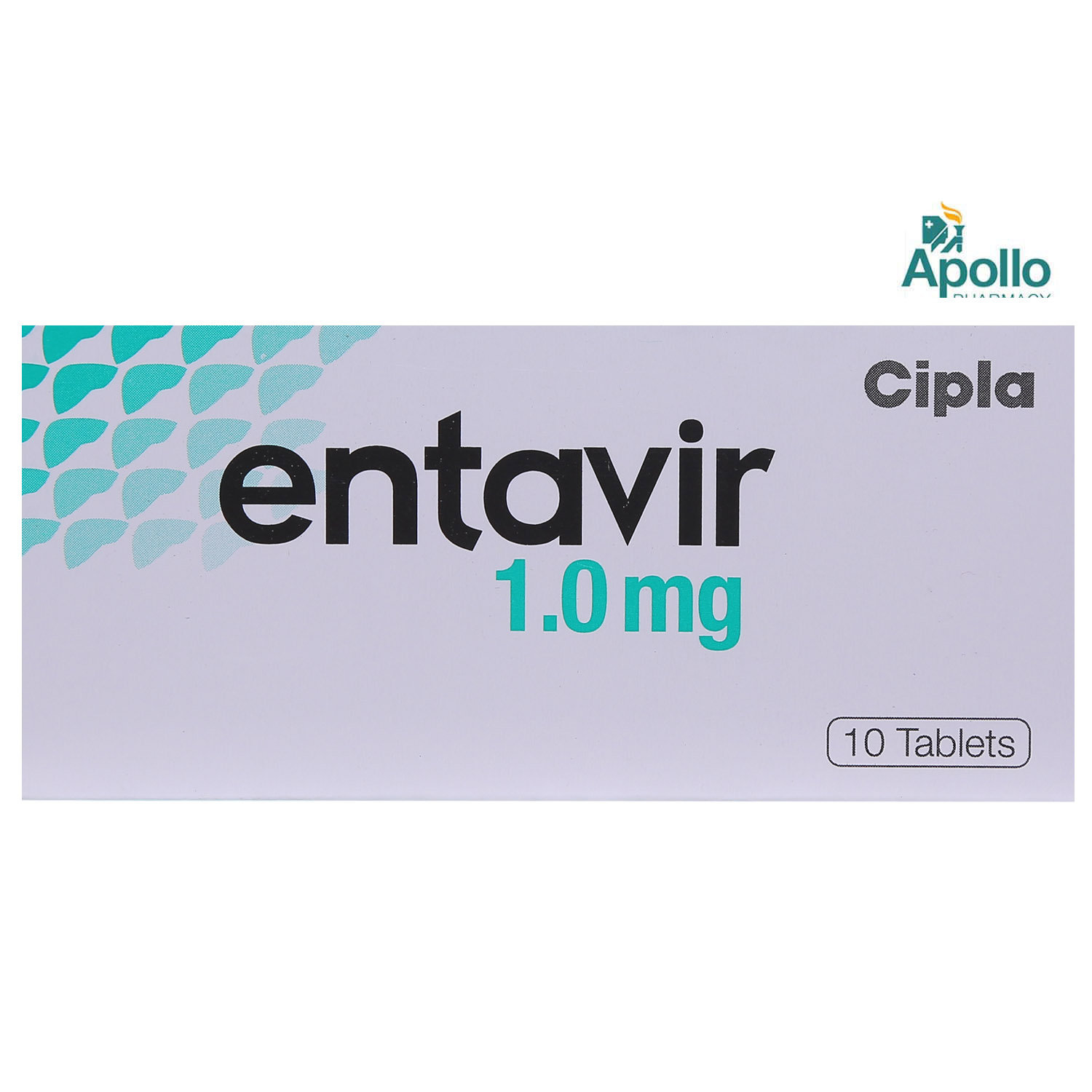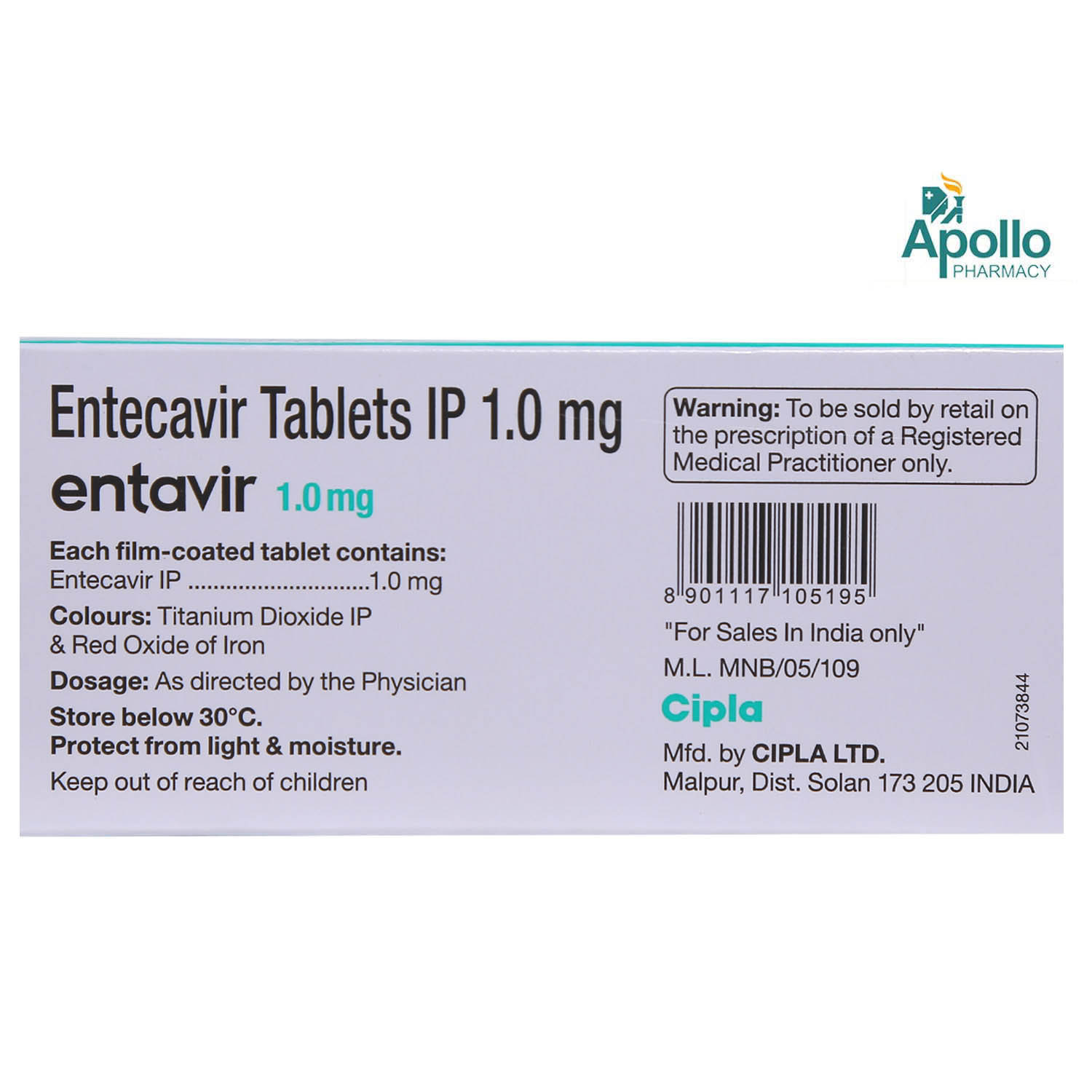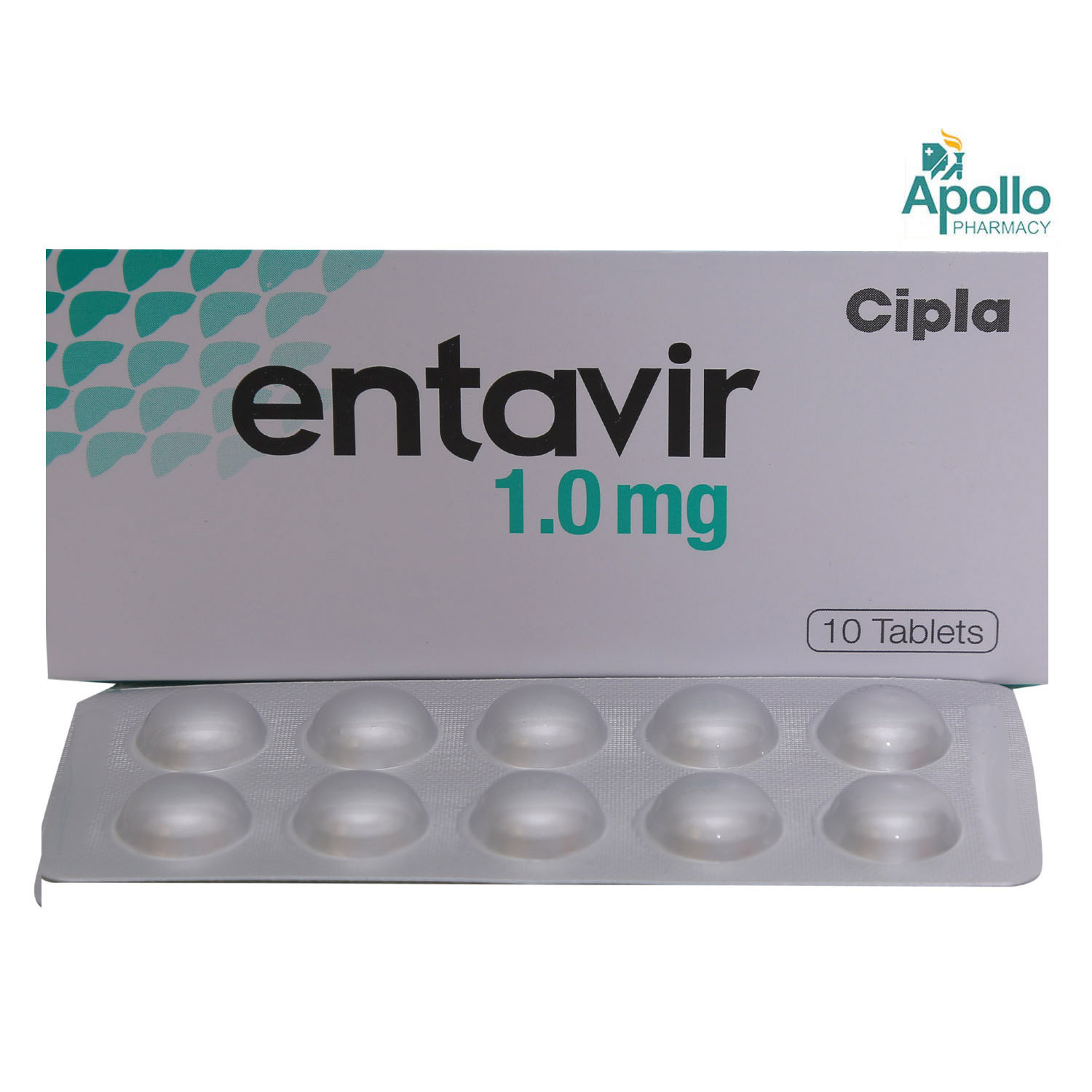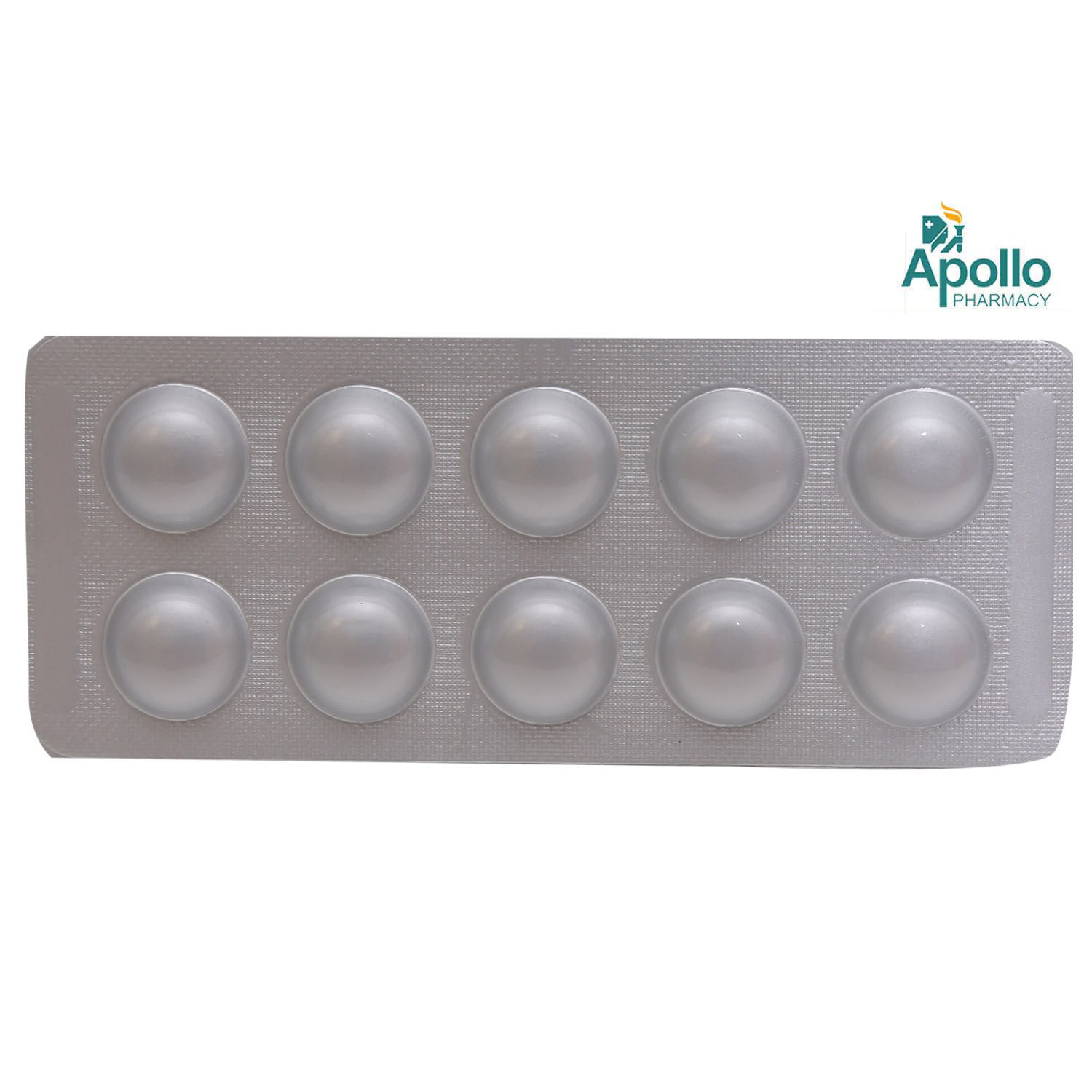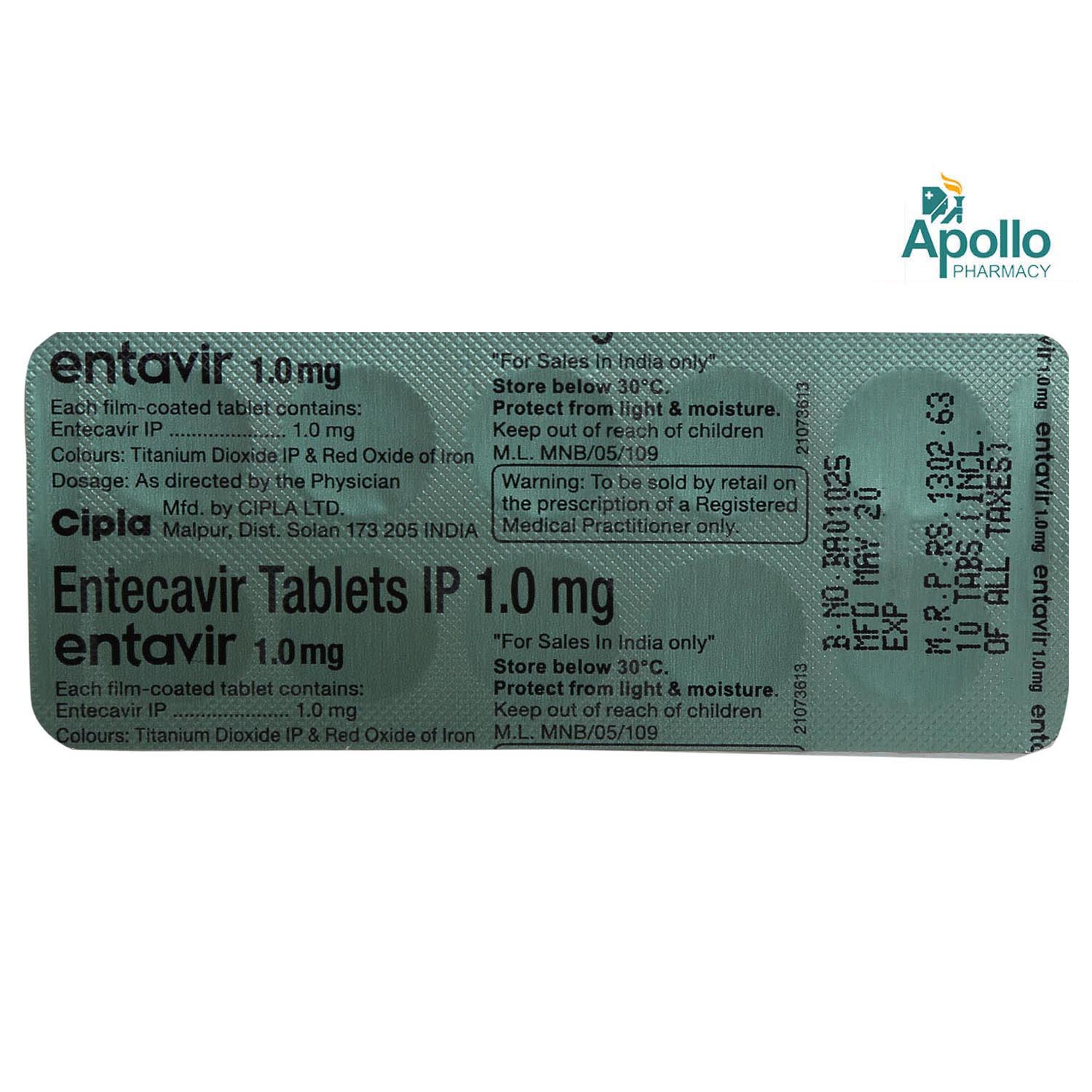Entavir 1 mg Tablet 10's
MRP ₹1219.5
(Inclusive of all Taxes)
₹182.9 Cashback (15%)
Provide Delivery Location
Online payment accepted
 Prescription drug
Prescription drugWhats That
Composition :
Manufacturer/Marketer :
Consume Type :
Expires on or after :
Return Policy :
NPPA :
About Entavir 1 mg Tablet
Entavir 1 mg Tablet belongs to a class of drugs called antivirals used to treat chronic hepatitis B virus (HBV) infection. Hepatitis B is a severe liver infection caused by the hepatitis B virus (HBV). It is highly contagious (spreads from one person to another) and spreads through intimate contact with the infected person, direct contact with infected blood, being pricked with a contaminated needle, using a razor or any other personal items with leftovers of infected fluid or even transfer from mother to baby during birth.
Entavir 1 mg Tablet contains Entecavir, an antiviral drug that works by inhibiting viral DNA polymerase enzyme action in the liver cells that is essential for the virus to multiply. Thereby, it stops the virus from making new viruses and reduces the amount of hepatitis B virus in the body.
Take Entavir 1 mg Tablet as prescribed by your doctor. You are advised to take Entavir 1 mg Tablet for as long as your doctor has prescribed it for you based on your medical condition. In some cases, you may experience dizziness, headache, nausea, vomiting, drowsiness, extreme tiredness, insomnia (inability to sleep), diarrhoea, or indigestion. Most of these side effects of Entavir 1 mg Tablet do not require medical attention and gradually resolve over time. However, if the side effects persist or worsen, please consult your doctor.
If you are allergic to Entavir 1 mg Tablet or any other medicines, please tell your doctor. If you are pregnant or breastfeeding, please consult a doctor before taking Entavir 1 mg Tablet . It is recommended to use effective contraceptive methods while using Entavir 1 mg Tablet to avoid pregnancy. Entavir 1 mg Tablet is not recommended for children below 2 years of age. If you experience stomach pain, vomiting, or nausea while taking Entavir 1 mg Tablet , it might indicate lactic acidosis development. This rare but serious side effect has occasionally been fatal. Lactic acidosis occurs more often in women, particularly if they are very overweight. Your doctor will monitor you regularly while you are receiving. If you have HIV/AIDS, kidney or liver problems, inform your doctor before taking Entavir 1 mg Tablet .
Uses of Entavir 1 mg Tablet
Directions for Use
Key Benefits
Entavir 1 mg Tablet contains Entecavir, an antiviral drug used to treat chronic hepatitis B virus (HBV) infection. Entavir 1 mg Tablet works by inhibiting viral DNA polymerase enzyme action in the liver cells that is essential for the virus to multiply. Thereby, it stops the virus from making new viruses and reduces the amount of hepatitis B virus in the body. Thus, decreases damage to the liver and improves liver functioning.
Storage
- Prepare for a restful night's sleep: Develop a calming pre-sleep routine, like reading or meditation, to help your body relax and prepare for sleep.
- Create a sleep-conducive Environment: Make bedroom a sleep haven by ensuring it is quiet, dark and calm.
- Follow a Sleep Schedule: Go to bed and get up at the same time every day to help regulate your body's internal clock and increase sleep quality.
- Try relaxing techniques like deep breathing, mindfulness meditation and any others.
- Limit stimulating activities before bedtime: Avoid stimulating activities before bedtime to improve sleep quality.
- Monitor Progress: Keep track of your sleep patterns to identify areas for improvement.
- Consult a doctor if needed: If these steps don't improve your sleep, consult a doctor for further guidance and therapy.
- Avoid driving or operating machinery or activities that require high focus until you know how the medication affects you.
- Maintain a fixed sleeping schedule, create a relaxing bedtime routine and ensure your sleeping space is comfortable to maximize your sleep quality.
- Limit alcohol and caffeine as these may worsen drowsiness and disturb sleep patterns.
- Drink plenty of water as it helps with alertness and keeps you hydrated and for overall well-being.
- Moderate physical activity can improve energy levels, but avoid intense workouts right before bedtime.
- Preventing Vomiting (Before it Happens)
- Take medication exactly as prescribed by your doctor. This can help minimize side effects, including vomiting.
- Having a small meal before taking your medication can help reduce nausea and vomiting.
- Talk to your doctor about taking anti-nausea medication along with your prescribed medication.
- Managing Vomiting (If it Happens)
- Try taking ginger in the form of tea, ale, or candy to help alleviate nausea and vomiting.
- What to Do if Vomiting Persists
- Consult your doctor if vomiting continues or worsens, consult the doctor for guidance on adjusting your medication or additional treatment.
- Inform Your Doctor: Notify your doctor immediately about your diarrhoea symptoms. This allows them to adjust your medication or provide guidance on managing side effects.
- Stay Hydrated: Drink plenty of fluids to replace lost water and electrolytes. Choose water, clear broth, and electrolyte-rich drinks. Avoid carbonated or caffeinated beverages to effectively rehydrate your body.
- Follow a Bland Diet: Eat easy-to-digest foods to help firm up your stool and settle your stomach. Try incorporating bananas, rice, applesauce, toast, plain crackers, and boiled vegetables into your diet.
- Avoid Trigger Foods: Steer clear of foods that can worsen diarrhoea, such as spicy, fatty, or greasy foods, high-fibre foods, and dairy products (especially if you're lactose intolerant).
- Practice Good Hygiene: Maintain good hygiene to prevent the spread of infection. To stay healthy, wash your hands frequently, clean and disinfect surfaces regularly, and avoid exchanging personal belongings with others.
- Take Anti-Diarrheal Medications: If your doctor advises, anti-diarrheal medications such as loperamide might help manage diarrhoea symptoms. Always follow your doctor's directions.
- Keep track of your diarrhoea symptoms. If they don't get better or worse or are accompanied by severe stomach pain, blood, or dehydration signs (like extreme thirst or dark urine), seek medical help.
- Inform your doctor about the nausea and discuss possible alternatives to the medication or adjustments to the dosage.
- Divide your daily food intake into smaller, more frequent meals to reduce nausea.
- Opt for bland, easily digestible foods like crackers, toast, plain rice, bananas, and applesauce.
- Avoid certain foods that can trigger nausea, such as fatty, greasy, spicy, and smelly foods.
- Drink plenty of fluids, such as water, clear broth, or electrolyte-rich beverages like coconut water or sports drinks.
- Use ginger (tea, ale, or candies) to help relieve nausea.
- Get adequate rest and also avoid strenuous activities that can worsen nausea.
- Talk to your doctor about taking anti-nausea medication if your nausea is severe.
- Record when your nausea occurs, what triggers it, and what provides relief to help you identify patterns and manage your symptoms more effectively.
- Take medications with food (if recommended): It can help prevent stomach distress and indigestion.
- Eat smaller, more frequent meals: Divide daily food intake into smaller, more frequent meals to ease digestion.
- Avoid trigger foods: Identify and avoid foods that trigger indigestion, such as spicy, fatty, or acidic foods.
- Stay upright after eating: Sit or stand upright for at least 1-2 hours after eating to prevent stomach acid from flowing into the oesophagus.
- Avoid carbonated drinks: Avoid drinking carbonated beverages, such as soda or beer, which can worsen indigestion.
- Manage stress: To alleviate indigestion, engage in stress-reducing activities like deep breathing exercises or meditation.
- Consult a doctor if needed: If indigestion worsens or persists, consult a healthcare professional to adjust the medication regimen or explore alternative treatments.
Drug Warnings
If you are allergic to Entavir 1 mg Tablet or any other medicines, please tell your doctor. If you are pregnant or breastfeeding, please consult a doctor before taking Entavir 1 mg Tablet . It is recommended to use effective contraceptive methods while using Entavir 1 mg Tablet to avoid pregnancy. Entavir 1 mg Tablet is not recommended for children below 2 years of age. You are advised to take proper precautions if you are infected with hepatitis B virus infection to prevent infection spread to others through sexual contact or body fluids. Hepatitis B vaccine should be taken to prevent Hepatitis B virus infection. If you experience stomach pain, vomiting or nausea while taking Entavir 1 mg Tablet , it might indicate lactic acidosis development. This rare but serious side effect has occasionally been fatal. Lactic acidosis occurs more often in women, particularly if they are very overweight. Your doctor will monitor you regularly while you are receiving. If you have HIV/AIDS, kidney or liver problems, inform your doctor before taking Entavir 1 mg Tablet .
Drug-Drug Interactions
Drug-Drug Interactions
Login/Sign Up
Coadministration of Allopurinol with Entavir 1 mg Tablet may increase the blood levels of one or both medicines and increase side effects.
How to manage the interaction:
If you are supposed to take Allopurinol and Entavir 1 mg Tablet together, your doctor may adjust the dose or monitor you more frequently to safely use both medications. However, if you experience increased side effects, contact your doctor.
The combined use of Entavir 1 mg Tablet with methotrexate may increase levels of Entavir 1 mg Tablet, and increase the risk or severity of kidney damage.
How to manage the interaction:
Although there is a possible interaction between Entavir 1 mg Tablet and methotrexate, you can take these medicines together if prescribed by your doctor. However, if you experience any symptoms such as nausea, vomiting, loss of appetite, increased or decreased urination, sudden weight gain or weight loss, fluid retention, swelling, shortness of breath, tiredness, weakness, dizziness. Consult a doctor. Do not stop using any medications without consulting a doctor.
Combining Entavir 1 mg Tablet with ciprofloxacin may result in higher blood levels of one or both the medications.
How to manage the interaction:
Although taking ciprofloxacin and Entavir 1 mg Tablet together can possibly result in an interaction, it can be taken if your doctor has prescribed it. If your situation changes or you start to notice more side effects, consult your doctor.
Drug-Food Interactions
Drug-Food Interactions
Login/Sign Up
Diet & Lifestyle Advise
- Include plenty of vegetables and fruits, and whole grains such as brown rice, oats, quinoa, and barley.
- Eat lean protein such as skinless chicken, fish, beans, and egg whites.
- Include healthy fats like avocados, olive oil, and nuts.
- Eat low-fat or non-fat dairy products to minimize damage to the liver.
- Drink plenty of water for better processing of food by the body.
- Avoid sugary foods such as cake, cookies, packaged baked food, or soda. Also, avoid heavy salt foods.
- Avoid foods containing saturated fats such as fried foods, fatty cuts of meat, sour cream, butter, and other high-fat dairy products as they may lead to weight gain and result in fatty liver.
- Avoid smoking and alcohol consumption as they may increase the risk of liver damage.
Side Effects of Entavir 1 mg Tablet
- Dizziness
- Headache
- Nausea
- Vomiting
- Drowsiness
- Extreme tiredness
- Insomnia (inability to sleep)
- Diarrhoea
- Indigestion
Habit Forming
Therapeutic Class
All Substitutes & Brand Comparisons
RX
Out of StockX-Vir 1 mg Tablet 30's
Natco Pharma Ltd
₹112.5
(₹3.75 per unit)
96% CHEAPERRX
Out of StockEntarica 1 Tablet
₹3550
(₹97.03 per unit)
20% CHEAPERRX
Out of StockENTEHEP 1MG TABLET
Cadila Healthcare Ltd
₹1219.5
(₹107.32 per unit)
11% CHEAPER
Author Details
We provide you with authentic, trustworthy and relevant information
Drug-Diseases Interactions
Drug-Diseases Interactions
Login/Sign Up
FAQs
Entavir 1 mg Tablet contains Entecavir, an antiviral drug that works by preventing viral DNA polymerase enzyme action in the liver cells that is essential for the virus to multiply. Thereby, it stops the virus from making new viruses and reduces the amount of hepatitis B virus in the body.
Yes, hepatitis B virus infection is highly contagious and spreads from one person to another. Therefore, it is recommended to avoid sharing personal items or needles containing an infected person's blood or body fluids.
Entavir 1 mg Tablet may cause lactic acidosis (excess of lactic acid in the blood), a rare but a severe side effect, especially in women who are very obese. However, if you experience stomach pain, vomiting or nausea while taking Entavir 1 mg Tablet , please consult a doctor immediately.
You are not recommended to take Entavir 1 mg Tablet with celecoxib (painkiller), as it may increase the blood levels of Entavir 1 mg Tablet , leading to more adverse effects and may also affect kidney function. However, please consult your doctor before taking Entavir 1 mg Tablet with other medicines.
Entavir 1 mg Tablet does not cure hepatitis B virus infection. Entavir 1 mg Tablet reduces the amount of hepatitis B virus in the body and improves liver functioning by decreasing liver damage.
Entavir 1 mg Tablet is not recommended for hepatitis B patients with HIV infection unless they are taking medicines to treat HIV infection at the same time as Entavir 1 mg Tablet may cause HIV infection to become resistant to certain HIV drugs and reduce their effectiveness. Therefore, it is advised to get tested for HIV infection before taking Entavir 1 mg Tablet .
You are not recommended to stop taking Entavir 1 mg Tablet without consulting your doctor as it may worsen the infection or cause recurring symptoms. Therefore, take Entavir 1 mg Tablet for as long as your doctor has prescribed it, and if you experience any difficulty while taking Entavir 1 mg Tablet , please consult your doctor.
Drug-Drug Interactions Checker List
- CELECOXIB
- ZOLEDRONIC ACID
Special Advise
Regular blood tests are recommended while taking Entavir 1 mg Tablet and several months after treatment with Entavir 1 mg Tablet to monitor liver functioning.
Disease/Condition Glossary
Hepatitis B: It is a severe liver infection caused by the hepatitis B virus (HBV). It is highly contagious (spreads from one person to another) and spreads through intimate contact with the infected person, direct contact with infected blood, being pricked with a contaminated needle, using a razor or any other personal items with leftovers of infected fluid or even transfer from mother to baby during birth. The virus can live for up to 7 days outside the body. Chronic hepatitis B develops slowly, and the symptoms may not be clear unless complications develop. The symptoms of hepatitis B may appear after 3 months of exposure to the virus and can last for 2 to 12 weeks. The complications of chronic hepatitis B include liver failure, liver cancer or liver cirrhosis (scarring). Hepatitis B can be prevented by taking the vaccination.

Have a query?
Alcohol
Safe if prescribed
Interaction of alcohol with Entavir 1 mg Tablet is unknown. Please consult a doctor before consuming alcohol while using Entavir 1 mg Tablet .
Pregnancy
Consult your doctor
Entavir 1 mg Tablet is a category C pregnancy drug and is given to pregnant women only if the doctor thinks benefits outweigh risks.
Breast Feeding
Consult your doctor
It is unknown whether Entavir 1 mg Tablet is excreted in human milk. Therefore, please consult a doctor if you are breastfeeding. Entavir 1 mg Tablet is given to breastfeeding mothers only if the doctor thinks benefits are greater than risks.
Driving
Safe if prescribed
Entavir 1 mg Tablet may cause dizziness, drowsiness or tiredness in some people. Therefore, avoid driving or operating heavy machinery if you feel dizzy, drowsy or tired after taking Entavir 1 mg Tablet .
Liver
Consult your doctor
Take Entavir 1 mg Tablet with caution, especially if you have a history of Liver diseases/conditions. The dose may be adjusted by your doctor as required. Please consult a doctor.
Kidney
Consult your doctor
Take Entavir 1 mg Tablet with caution, especially if you have a history of Kidney diseases/conditions. The dose may be adjusted by your doctor as required. Please consult a doctor.
Children
Safe if prescribed
Entavir 1 mg Tablet is not recommended for children below 2 years or weighing less than 10 kg. However, in children above 2 years, Entavir 1 mg Tablet should be used with caution and doses prescribed by a doctor.

